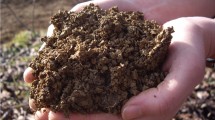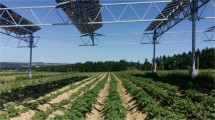Abstract
Public policies are promoting biofuels as an alternative to fossil fuel consumption in order to mitigate greenhouse gas (GHG) emissions. However, the mitigation benefit can be at least partially compromised by emissions occurring during feedstock production. One of the key sources of GHG emissions from biofuel feedstock production, as well as conventional crops, is soil nitrous oxide (N2O), which is largely driven by nitrogen (N) management. Our objective was to determine how much GHG emissions could be reduced by encouraging alternative N management practices through application of nitrification inhibitors and a cap on N fertilization. We used the US Renewable Fuel Standards (RFS2) as the basis for a case study to evaluate technical and economic drivers influencing the N management mitigation strategies. We estimated soil N2O emissions using the DayCent ecosystem model and applied the US Forest and Agricultural Sector Optimization Model with Greenhouse Gases (FASOMGHG) to project GHG emissions for the agricultural sector, as influenced by biofuel scenarios and N management options. Relative to the current RSF2 policy with no N management interventions, results show decreases in N2O emissions ranging from 3 to 4 % for the agricultural sector (5.5–6.5 million metric tonnes CO2 eq. year−1; 1 million metric tonnes is equivalent to a Teragram) in response to a cap that reduces N fertilizer application and even larger reductions with application of nitrification inhibitors, ranging from 9 to 10 % (15.5–16.6 million tonnes CO2 eq. year−1). The results demonstrate that climate and energy policies promoting biofuel production could consider options to manage the N cycle with alternative fertilization practices for the agricultural sector and likely enhance the mitigation of GHG emissions associated with biofuels.



Similar content being viewed by others
References
Adams D, Alig R, McCarl BA, Murray BC (2005) FASOMGHG conceptual structure, and specification: documentation. http://agecon2.tamu.edu/people/faculty/mccarl-bruce/papers/1212FASOMGHG_doc.pdf. Cited 6 Aug 2014
Adler PR, Del Grosso SJ, Parton WJ (2007) Life cycle assessment of net greenhouse gas flux for bioenergy cropping systems. Ecol Appl 17:675–691
Adler PR, Del Grosso SJ, Inman D et al (2012) Mitigation opportunities for life cycle greenhouse gas emissions during feedstock production across heterogeneous landscapes. In: Liebig M, Franzluebbers AJ, Follett RF (eds) Managing agricultural greenhouse gases: coordinated agricultural research through GRACEnet to address our changing climate. Elsevier Publishing, New York
Akaike H (1973) Information theory and an extension of the maximum likelihood principle. In: Petrov BN, Caski F (eds), Second international symposium on information theory, Budapest, Hungary, 2-8 September 1971, pp. 267–281
Akiyama H, Yan X, Yagi K (2010) Evaluation of effectiveness of enhanced-efficiency fertilizers as mitigation options for N2O and NO emissions from agricultural soils: meta-analysis. Glob Chang Biol 16:1837–1846
Antle J, Ogle SM (2012) Influence of soil C, N2O and fuel use on GHG mitigation with no-till adoption. Clim Chang 111:609–625
Baker JS, McCarl BA, Murray BC et al (2010) Net farm income and land use under a U.S. greenhouse gas cap-and-trade. AAEA Policy Issues 7:1–5
Baker JS, Murray BC, McCarl BA et al (2011) Greenhouse emissions and nitrogen use in U.S. agriculture: historic trends, future projections, and biofuel policy scenarios. NI R 11–08. Nicholas Institute Environmental Policy Solutions, Duke University, Durham
Baker JS, Murray BC, McCarl BA et al (2013) Implications of alternative agricultural productivity growth assumptions on land management, greenhouse gas emissions, and mitigation potential. Am J Agric Econ 95:435–441
Beach RH, Adams DM, Alig RJ et al (2010) Model documentation for the Forest and Agricultural Sector Optimization Model with Greenhouse Gases (FASOMGHG). U.S. Environmental Protection Agency, Climate Change Division, Washington, D.C
Bouwman AF, van Grinsven JJM, Eickhout B (2010) Consequences of the cultivation of energy crops for the global nitrogen cycle. Ecol Appl 20:101–109
Burnham KP, Anderson DR (2002) Model selection and multi-model inference: a practical information-theoretic approach, 2nd edn. Springer, New York, USA, p 488
Cavigelli MA, Mirsky SB, Teasdale JR et al (2013) Organic grain cropping systems to enhance ecosystem services. Renewable Agric Food Syst 28:145–159
CBO (2009) The impact of ethanol use on food prices and greenhouse-gas emissions. The Congress of the United States. Congressional Budget Office, Washington, D.C
Conant RT, Berdanier AB, Grace PR (2013) Patterns and trends in nitrogen use and nitrogen recovery efficiency in world agriculture. Glob Biogeochem Cycles 27:558–566
Crutzen PJ, Mosier AR, Smith KA, Winiwarter W (2008) N2O release from agro-biofuel production negates global warming reduction by replacing fossil fuels. Atmos Chem Phys 8:389–395
CTIC (2004) 2004 Crop residue management survey. Conservation Technology Information Center. Available online at <http://www.ctic.purdue.edu/CRM/>
Davidson EA (2009) The contribution of manure and fertilizer nitrogen to atmospheric nitrous oxide since 1860. Nat Geosci 2:659–662
Davis SC, Parton WJ, Dohleman FG et al (2010) Comparative biogeochemical cycles of bioenergy crops reveal nitrogen-fixation and low greenhouse gas emissions in a Miscanthus * giganteus agro-ecosystem. Ecosystems 13:144–156
Davis SC, Boddey RM, Alves BJR et al (2013) Management swing potential for bioenergy crops. GCB Bioenergy 5:623–638
De Klein C, Novoa RSA, Ogle S et al (2006) N2O emissions from managed soil, and CO2 emissions from lime and urea application. In: Eggleston S, Buendia L, Miwa K, Ngara T, Tanabe K (eds) IPCC guidelines for national greenhouse gas inventories, Vol. 4: Agriculture, forestry and other land use. Intergovernmental Panel on Climate Change. National Greenhouse Gas Inventory Programme, IGES, Hayama, p 54
Del Grosso SJ, Mosier AR, Parton WJ, Ojima DS (2005) DAYCENT model analysis of past and contemporary soil N2O and net greenhouse gas flux for major crops in the USA. Soil Tillage Res 83:9–24
Del Grosso SJ, Parton WJ, Mosier AR et al (2006) DAYCENT national scale simulations of N2O emissions from cropped soils in the USA. J Environ Qual 35:1451–1460
Del Grosso SJ, Wirth T, Ogle SM, Parton WJ (2008) Estimating agricultural nitrous oxide emissions. Eos 89:529–530
Del Grosso SJ, Ojima DS, Parton WJ et al (2009) Global Scale DAYCENT model analysis of greenhouse gas mitigation strategies for cropped soils. Glob Planet Chang 67:44–50
Del Grosso S, Ogle SM, Parton WJ, Breidt FJ (2010) Estimating uncertainty in N2O emissions from US cropland soils. Glob Biogeochem Cycles 24, GB1009
Elobeid A, Carriquiry M, Dumortier J et al (2013) Biofuel expansion, fertilizer use and GHG emissions: unintended consequences of mitigation policies. Econ Res Int 2013:708604. doi:10.1155/2013/708604
Erisman JW, van Grinsven H, Leip A, Mosier A, Bleeker A (2009) Nitrogen and biofuels; an overview of the current state of knowledge. Nutr Cycl Agroecosyst 86:211–223
Firestone MK, Davidson EA (1989) Microbiological basis of NO and N2O production and consumption in soil. In: Andreae MO, Schimel DS (eds) Exchange of trace gases between terrestrial ecosystems and the atmosphere. Wiley, New York
Halvorson AD, Del Grosso SJ, Alluvione F (2010) Tillage and inorganic nitrogen source effects on nitrous oxide emissions from irrigated cropping systems. SSSAJ 74:436–445
Havlík P, Valin H, Herrero M et al (2014) Climate change mitigation through livestock system changes. Proc Natl Acad Sci 110:3709–3714
Havlík P, Valin H, Mosnier A et al (2013) Crop productivity and the global livestock sector: implications for land use change and greenhouse gas emission. Am J Agric Econ 95:442–448
Homer C, Dewitz J, Fry J et al (2007) Completion of the 2001 National Land Cover Database for the conterminous United States. Photogramm Eng Remote Sens 73:337–341
IPCC (2014) Agriculture, forestry, and other land use (AFOLU). In: Edenhofer O, Pichs-Madruga R, Sokona Y et al (eds) Mitigation of climate change. Contribution of Working Group III to the Fifth Assessment Report of the Intergovernmental Panel on Climate Change. Cambridge University Press, Cambridge, p 181
Johnson DM, Mueller R (2010) The 2009 cropland data layer. Photogramm Eng Remote Sens 76:1201–1205
Kim S, Dale BE (2009) Regional variations in greenhouse gas emissions of biobased products in the United States-corn-based ethanol and soybean oil. Int J Life Cycle Assess 14:540–546
Laboski C (2006) Does it pay to use nitrification and urease inhibitors? In Proceedings of the Wisconsin Fertilizer, AgLime & Pest Management Conference, Volume 45, pp.44–50
Liu XJ, Mosier AR, Halvorson AD, Zhang FS (2006) The impact of nitrogen placement and tillage on NO, N2O, CH4 and CO2 fluxes from a clay loam soil. Plant Soil 280:177–188
McCarl BA, Schneider UA (2001) Greenhouse gas mitigation in US Agriculture and Forestry. Science 294:2481–2482
Mellilo JM, Reilly JM, Kicklighter DW, Gurgel AC, Cronin TW, Paltsev S, Felzer BS, Wang X, Sokolov AP, Schlosser CA (2009) Indirect emissions from biofuels: how important? Science 326:1397–1399
Mitchell R, Vogel KP, Sarath G (2008) Managing and enhancing switchgrass as a bioenergy feedstock. Biofuels Bioprod Biorefin 2:530–539
Mosier AR, Duxbury JM, Freney JR, Heinemeyer O, Minami K (1998) Assessing and mitigating N2O emissions from agricultural soils. Clim Chang 40:7–38
Mosnier A, Havlk P, Valin H et al (2013) Alternative U.S. biofuel mandates and global GHG emissions: the role of land use change, crop management and yield growth. Energy Policy 57:602–614
Murray BC, Sommer AJ, Depro B (2005) Greenhouse gas mitigation potential in US Forestry and Agriculture. US Environmental Protection Agency, Washington, D.C, Report 430-R-05-006
Parton WJ, Hartman MD, Ojima DS, Schimel DS (1998) DAYCENT: its land surface submodel: description and testing. Glob Planet Chang 19:35–48
Piñeiro G, Jobbagy EG, Baker JS et al (2009) Set-asides can be better climate investment than corn ethanol. Ecol Appl 19:277–282
Pinheiro JC, Bates DM (2000) Mixed-effect models in S and S-Plus. Springer, New York, p 528
Ravishankara AR, Daniel JS, Portmann RW (2009) Nitrous oxide (N2O): the dominant ozone-depleting substance emitted in the 21st century. Science 326:123–125
Robertson GP, Vitousek PM (2009) Nitrogen in agriculture: balancing the cost of an essential resource. Annu Rev Environ Resour 34:97–125
Saxton KE, Rawls WJ, Romberger JS, Papendick RI (1986) Estimating generalized soil-water characteristics from texture. SSSAJ 50:1031–1036
Scharlemann JPW, Laurance WF (2008) How green are biofuels? Science 319:43–44
Schou J, Skop E, Jensen J (2000) Integrated agr-environmental modeling: a cost-effectiveness analysis of two nitrogen tax instruments in the Vejle Fjord watershed, Denmark. J Environ Manag 58:199–212
Smith P, Martino D, Cai Z et al (2007) Greenhouse gas mitigation in agriculture. Phil Trans R Soc B. doi:10.1098/rstb.2007.2184
Thornton PE, Running SW (1999) An improved algorithm for estimating incident daily solar radiation from measurements of temperature, humidity, and precipitation. Agric Forest Meteorol 93:211–228
Thornton PE, Running SW, White MA (1997) Generating surfaces of daily meteorology variables over large regions of complex terrain. J Hydrol 190:214–251
Thornton PE, Hasenauer H, White MA (2000) Simultaneous estimation of daily solar radiation and humidity from observed temperature and precipitation: an application over complex terrain in Austria. Agric For Meteorol 104:255–271
USDA-ERS (1997) Cropping Practices Survey Data—1995. Research Service, United States Department of Agriculture, Washington, D.C
USDA-NASS (2010) Crop Production Summary, National Agricultural Statistics Service, Agricultural Statistics Board, U.S. Department of Agriculture, Washington, DC, http://usda.mannlib.cornell.edu/MannUsda/viewDocumentInfo.do?documentID=1047
US-EPA (2010a) Inventory of U.S. greenhouse gas emissions and sinks: 1990–2008. US Environmental Protection Agency, Office of Atmospheric Programs, Washington, D.C., p 407, EPA 430-R-10-006
US-EPA (2010b) Supplemental EPA Analysis of the American Clean Energy and Security Act of 2009. H.R. 2454 in the 111th Congress. US Environmental Protection Agency, Office of Atmospheric Programs, Washington, D.C., p 53
US-EPA (2014) Inventory of U.S. greenhouse gas emissions and sinks: 1990-2012. United States Environmental Protection Agency, EPA 430-R-14-003, Washington, DC.
Venterea RT, Burger M, Spokas KA (2005) Nitrogen oxide and methane emissions under varying tillage and fertilizer management. J Environ Qual 34:1467–1477
Zah R, Böni H, Gauch M et al (2007) Life cycle assessment of energy products: environmental impact assessment of biofuels. EMPA, St. Gallen
Acknowledgments
This research was funded by the US Environmental Protection Agency, Contract No. EP08C000106, with additional support from USDA-NIFA, Grant #2011-67003-30205. We thank Cindy Keough and Ram Gurung who performed the DayCent model simulations and developed the meta-models that were used in the FASOMGHG model analysis.
Author information
Authors and Affiliations
Corresponding author
Rights and permissions
About this article
Cite this article
Ogle, S.M., McCarl, B.A., Baker, J. et al. Managing the nitrogen cycle to reduce greenhouse gas emissions from crop production and biofuel expansion. Mitig Adapt Strateg Glob Change 21, 1197–1212 (2016). https://doi.org/10.1007/s11027-015-9645-0
Received:
Accepted:
Published:
Issue Date:
DOI: https://doi.org/10.1007/s11027-015-9645-0




